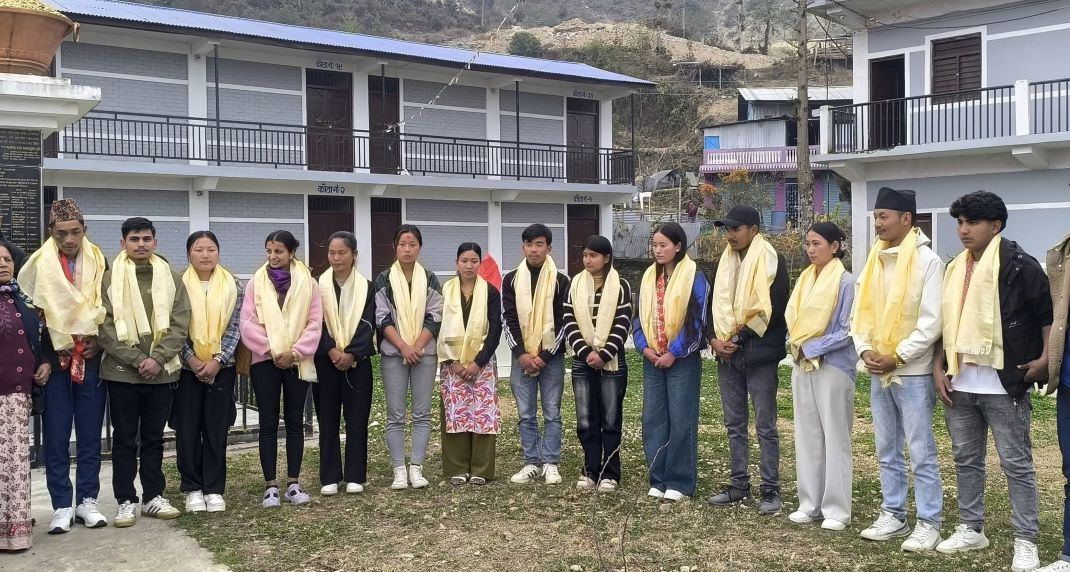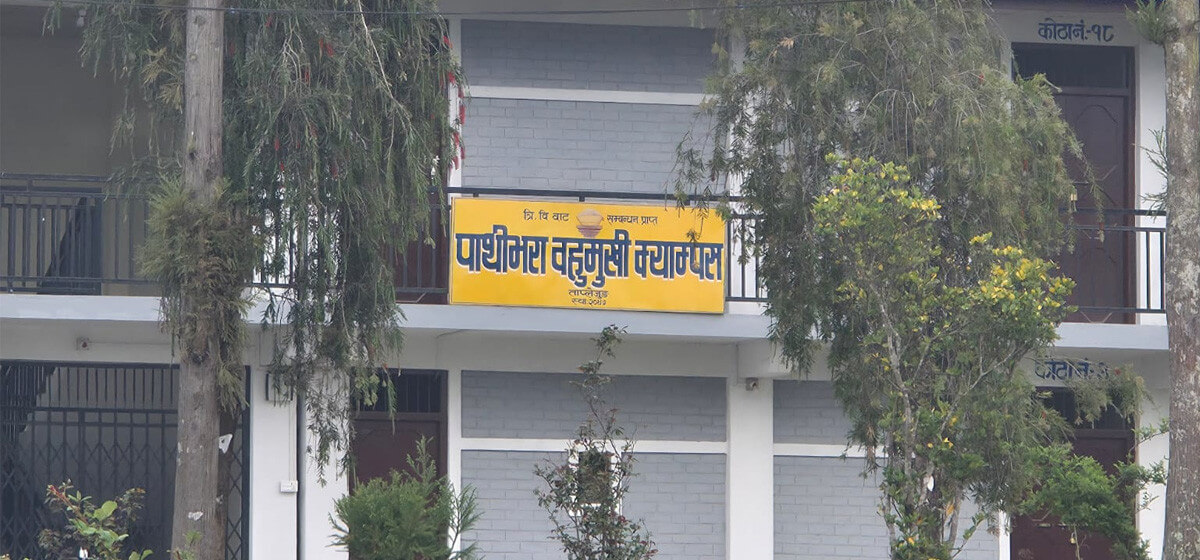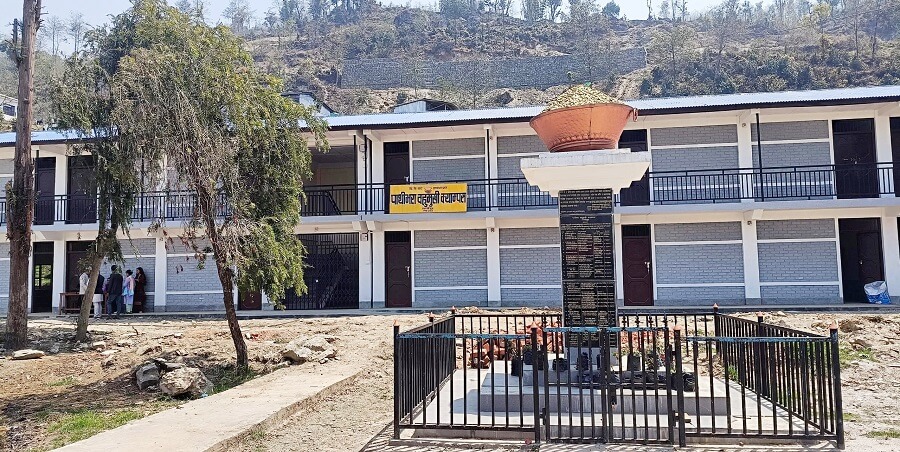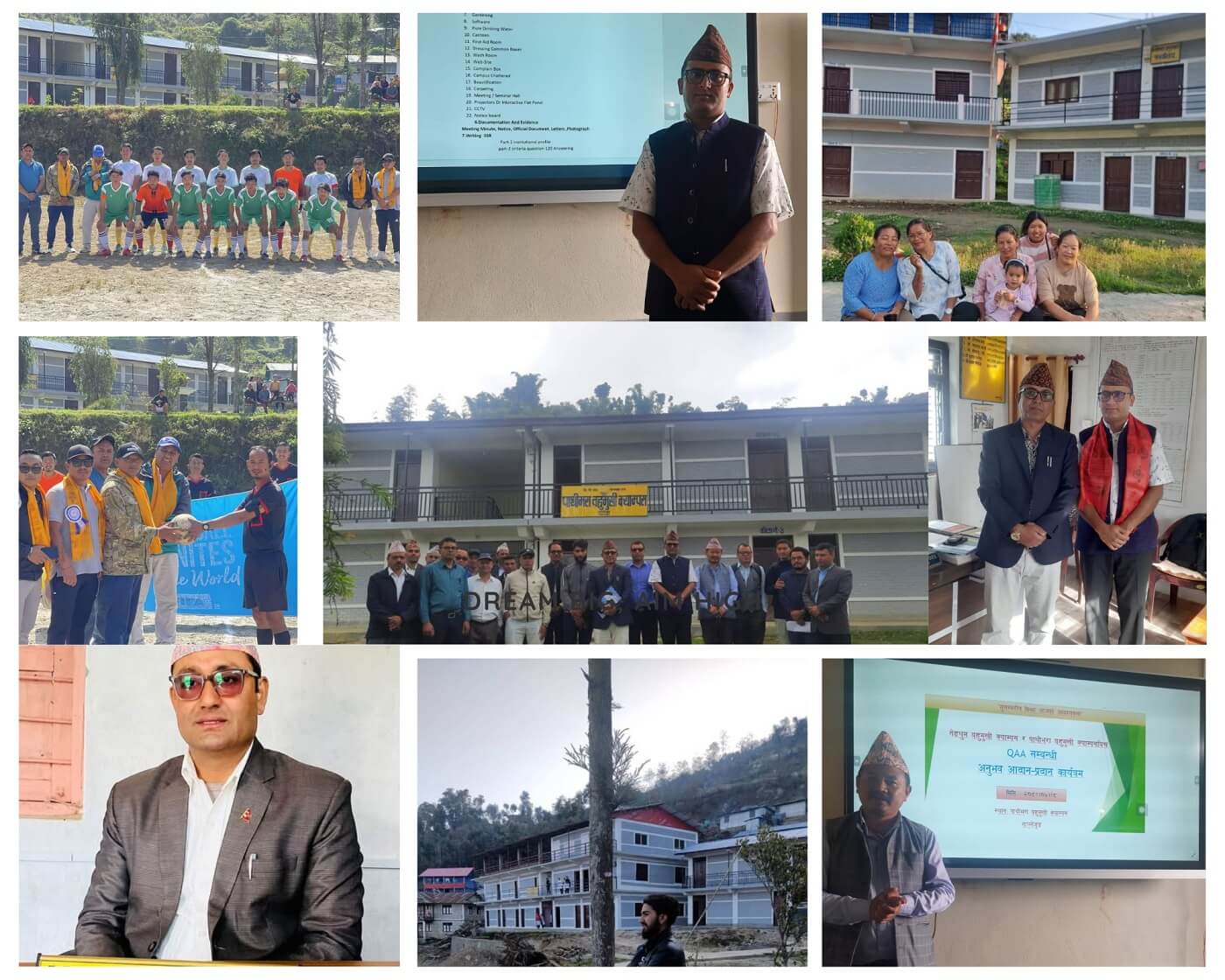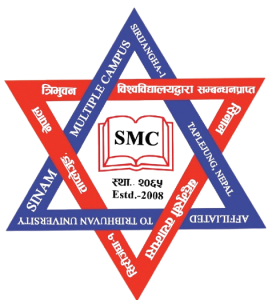Overview
Pathibhara Multiple Campus (PMC) is a Tribhuvan University–affiliated community campus in Phungling Municipality-4, Taplejung, Nepal. It offers bachelor’s programs in Bachelor of Education (B.Ed.), Bachelor of Business Studies (BBS), and Bachelor of Arts (BA), along with a Master of Education (M.Ed.) in Nepali and in Educational Planning and Management. The campus serves learners from Taplejung and nearby districts such as Panchthar and parts of Terhathum.
Established in 1990 (2047 BS) through local community effort, PMC operates without a permanent income source. Its finances come mainly from student fees, University Grants Commission (UGC) Nepal projects, and periodic support from local governments. The campus location is slightly away from the main town, which helps maintain a calm study environment. It welcomes students from all social and economic backgrounds.
Quick Highlights
-
Location: Phungling-4, Taplejung, eastern Nepal
-
Affiliation: Tribhuvan University (TU)
-
Programs: B.Ed., BBS, BA; M.Ed. (Nepali; Educational Planning & Management)
-
Governance: Community campus; non-profit model
-
Quality Work: UGC-linked projects; activities aligned with the Higher Education Reform Project (HERP)
-
Annual Reporting: Annual Report 2080 submitted to UGC
-
Landholding: 14-8-3-0 (approx. 0.74 hectares) with classrooms, library, offices, and grounds
-
Library Size: 8,092 items (books, references, journals)
-
Student Profile: Higher female participation across several programs
-
Future Direction: Interest in starting technical and vocational streams when feasible
Academic Programs Offered
Bachelor of Education (B.Ed.)
B.Ed. follows TU’s four-year structure with one major and one minor area. Common faculty-level areas include Nepali Education, English Education, Mathematics Education, Science Education (physical science), Health and Physical Education, Population Education, History Education, Geography Education, Economics Education, and Political Science Education. Students complete coursework, school-focused tasks, and practical components as per TU rules.
Who it suits: Students preparing for school teaching, academic support roles, or a pathway to M.Ed. and education research.
Outcomes: Readiness for classroom practice and eligibility for postgraduate study under TU regulations.
Bachelor of Business Studies (BBS)
BBS covers core business fields such as accounting, finance, marketing, economics, business law, and general management. Coursework links concepts with local contexts through assignments, report writing, and field observation.
Who it suits: Learners targeting roles in local enterprises, cooperatives, NGOs/INGOs, or public offices, as well as those considering entrepreneurship or graduate study in management.
Outcomes: Foundation in business functions with exposure to Nepali organizational settings.
Bachelor of Arts (BA)
BA provides a broad humanities and social sciences route. Depending on TU approvals and campus offerings, students typically select from subjects such as Nepali, English, sociology, population studies, history, or geography. The program builds reading, writing, and social inquiry skills useful in education support, media, social programs, and local governance.
Who it suits: Students seeking strong communication and analytical abilities with flexible career choices.
Outcomes: Preparedness for roles in education support, community projects, and further study in the humanities and social sciences.
Master of Education (M.Ed.)
PMC runs M.Ed. classes in Nepali and in Educational Planning and Management. The program supports in-service teachers and education graduates who aim to improve classroom practice, develop school leadership skills, and understand planning and administration.
Who it suits: Teachers, aspiring school leaders, education planners, and those preparing for research or further academic work.
Outcomes: Capacity to lead school improvement, design course activities under TU norms, and manage education programs.
Program availability, seat numbers, and teaching schedules follow TU approvals and campus notices for each session.
Admission Process
Eligibility
-
B.Ed., BBS, BA: 10+2 or equivalent from a recognized board with minimum marks set by TU.
-
M.Ed.: Bachelor’s degree in education or a relevant field as per TU rules, with required grades.
Steps
-
Application form: Obtain the form and prospectus from the campus during the admission window.
-
Document set: Academic transcripts and certificates, character certificate, copy of citizenship (or passport for foreign students), and photographs.
-
Selection: Merit-based screening as per TU criteria; interview if announced.
-
Seat confirmation: Fee payment within the stated deadline and registration at the campus office.
Intake timing: Based on TU’s academic calendar and campus notices. Late forms may be accepted within published grace periods if seats are available.
Subject planning: For B.Ed. and BA, confirm subject combinations early. The admission desk assists with mapping majors, minors, and progression rules.
Teaching Faculty and Learning Methodology
PMC follows TU curricula and uses participatory methods suited to each subject:
-
Lecture with guided discussion
-
Question–answer and interaction
-
Inquiry, small-scale research tasks, and fieldwork
-
Project-based assignments
-
Demonstration and experiment where applicable
-
Inductive and deductive approaches in subject teaching
-
Problem-solving and supported self-study
-
Technology-assisted sessions using projectors and laptops
Teachers focus on short feedback cycles, presentations, peer activities, and assignment support. Expanding ICT use in classrooms is a continuing goal, including better slide preparation, blended reading packets, and simple data tools for student work.
Infrastructure and Learning Facilities
Land and Buildings
The campus holds 14-8-3-0 land (about 0.74 hectares). Key facilities include classrooms, administrative spaces, and a library. Noted structures and works include:
-
Ten-room building (support: HPF and campus) — under construction
-
Old library building (four rooms) — support: UGC and campus
-
Two-storey mud building (four rooms) — support: DDC
-
Two-storey block with multiple rooms (ten rooms) — support: Municipality and UGC
-
Five-room mud building — internal support
-
Two-storey, three-room concrete building — DDC and UGC
-
Two-storey, two-room concrete building — UGC
-
Canteen — UGC+ support
-
Separate toilets for boys and girls — internal support
Compound, Security, and Water
-
Access: Gates on the east and north sides.
-
Perimeter: Boundary wall around the large ground; maintenance carried out as needed.
-
Water: Regular supply sourced from Ukalipani (Phungling-5, ~400 m). Two concrete taps support daily use. A metered line from a larger water project also serves the campus.
Library and Learning Resources
-
Books: 7,168
-
Reference materials: 832
-
Journals: 92
-
Total holdings: 8,092
The library opens for four hours during campus hours. Materials support course reading, assignments, and exam preparation. Longer hours and gradual digitization are future targets when resources allow.
ICT and Equipment
Campus inventory:
-
1 desktop computer; 4 laptops
-
1 projector
-
1 printer/photocopier
-
Fax connection
Provincial support (ICT development):
-
6 laptops; 2 desktop computers
-
1 projector
-
4 CCTV cameras with display set
Additional equipment:
-
OHP units (3)
-
Printers (3)
-
CC cameras (8 total with upgrades)
-
Card printer (1)
-
Solar panels (8 units; about 2 kW)
-
Monitors as supported by UGC
Connectivity: ADSL service supports teaching and administration.
Furniture and Classroom Utilities
-
Desk-benches: 475 pairs
-
Plastic chairs: 30
-
Arm chairs: 18
-
Sofa sets: 5
-
Steel cabinets: 7; wooden cabinets: 3
-
Tables: 10; tea tables: 6
-
24-compartment rack: 1
-
Revolving chairs: 5
-
Bed: 1
-
Computer tables: 2
-
Tables with rack: 8
-
Printers: 3
-
Whiteboards: 15
Playgrounds
-
Large ground: Internal + UGC support
-
Small ground: Internal support (2051 BS)
The grounds are used for sports, events, and selected ECA activities.
Student Life and Campus Experience
The setting is quiet and suited to focused study. Students usually work in small groups, consult faculty during office hours, and use the library window for reading. The campus applies basic safety measures such as gated entry and CCTV in selected areas.
A typical week includes lectures, tutorials, and assignment review. Before examinations, teachers conduct revision classes and sessions on writing, referencing, and time management. Many courses include short field tasks, local surveys, or practical assignments connected to course outcomes.
Extracurricular Activities (ECA)
ECA supports personal growth and community links. Based on annual plans and resources, activities may include:
-
Literary events such as essay, debate, and poetry
-
Seminars and talks with local practitioners and alumni
-
Sports on the large and small grounds
-
Community visits aligned with course tasks
-
Cultural and student-led events during the academic year
Students can propose clubs or events through faculty coordinators. The goal is inclusive participation with modest costs.
Scholarships and Financial Support
PMC relies on student fees, UGC projects, and limited contributions from municipalities and rural municipalities. Within these limits, the campus announces support measures through official notices.
Common routes include:
-
Merit-linked relief: Partial fee reductions when seats are available
-
Need-based support: For students facing financial hardship
-
Government/UGC programs: Based on project guidelines and timelines
-
Local body contributions: Small grants used for student support or facility upgrades
Information on eligibility, required documents, and deadlines appears on notice boards and at the help desk. Students should follow timelines and meet academic requirements to continue benefits.
Achievements and Institutional Milestones
-
Founding: 1990 (2047 BS) as a community initiative
-
Affiliations timeline:
-
2047 BS: PCL under TU
-
2059 BS: Bachelor’s programs under the Faculty of Humanities and Social Sciences
-
2062 BS: Faculty of Education
-
2066 BS: Faculty of Management
-
-
Postgraduate classes: M.Ed. since 29 Poush 2075 BS (Nepali; Educational Planning & Management)
-
Participation trend: Higher female enrollment indicated in recent internal data
-
Quality activity: HERP-linked work and regular reporting to UGC (Annual Report 2080)
These steps show consistent growth in access and completion within the region. The campus continues to improve classroom practice, ICT use, and library services as resources allow.
Why Choose This Institution?
-
Public campus with community roots: Serves Taplejung and nearby districts with transparent processes.
-
Recognized degrees: TU affiliation with clear pathways to postgraduate study.
-
On-site postgraduate option: M.Ed. in Nepali and Educational Planning & Management supports in-service teachers.
-
Reading support: Library holdings that cover course needs, references, and journals.
-
Student-centered classroom work: Participatory teaching, field tasks, and assignments that link to course outcomes.
-
Calm learning setting: Gated campus, CCTV coverage in key areas, and open spaces for study and sport.
-
Support windows: Merit and need-based relief announced through official notices; UGC and local bodies contribute when possible.
-
Regional service: Graduates work in schools, local offices, cooperatives, and social programs.
-
Accountability: Reporting to UGC and engagement with HERP indicators.
Conclusion
Pathibhara Multiple Campus offers TU-affiliated programs in education, business, and the humanities for students in the eastern hills. The campus model is community-based and non-profit, with a focus on access, steady academic work, and practical support. Priority areas include stronger classroom ICT, better access to reading materials, and gradual expansion toward technical and vocational fields when resources and approvals align.
Prospective students can check intake dates, subject combinations, fee details, and scholarship notices at the campus office. Parents, teachers, and local agencies will find clear information for planning, audit, and documentation needs.
Contact Pathivara Multiple Campus's administrative office for detailed information on the course, admissions, location, fees, scholarships, facilities, counseling or eligibility.
Contact Details
Pathibhara Multiple Campus
Phone Number: +977-24-460228, +977-9842660495
Email Address: Pathivara.Multiple@gmail.com
Website: https://pathivaracampus.edu.np


